|
|
|
Sort Order |
|
|
|
Items / Page
|
|
|
|
|
|
|
| Srl | Item |
| 1 |
ID:
113729
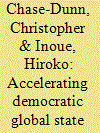

|
|
|
|
|
| Publication |
2012.
|
| Summary/Abstract |
This article discusses the evolution of the international system and global governance within the Europe-centred modern world-system since the 15th century in the context of a comparative framework that includes interpolity systems since the Stone Age. The evolution of the modern system includes the emergence of the European system of sovereign national states and colonial empires, the extension of the Westphalian system to the non-core by succeeding waves of decolonization, the rise and fall of successively larger hegemons, the deepening of global capitalism in waves of globalization, the emergence of weak international regulatory institutions and the prospects for and the rapid emergence of global democracy. It is not claimed that a global state has already emerged, but the authors see the long-term processes as the early stages of the emergence of a world state, and consider how these processes might be accelerated within the next few decades. The need for democratization of the institutions of global governance is also discussed. However, in this article, the focus is more on real geo-historical processes than normative questions, outlining the evolution of interpolity institutional orders, describing the challenges in thinking about global state formation, and discussing some of the technological and political forces that might accelerate the long-term trend toward global state formation.
|
|
|
|
|
|
|
|
|
|
|
|
|
|
|
|
| 2 |
ID:
113734
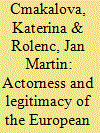

|
|
|
|
|
| Publication |
2012.
|
| Summary/Abstract |
The article surveys the current state of the academic debate about actorness and legitimacy of the European Union. It investigates various kinds of EU's actorness, as well as concepts and categories of its legitimacy, and attempts to trace their relationships, which remains an underdeveloped aspect of the discussion. We examine a wide range of scholarly articles, books and other academic sources in assessing the quality and fairness of the respective discussions and suggest that, within the current mostly normative debate, a positive evaluation of the EU's legitimacy is unattainable and that it is necessary to acquire a fairer notion of what kind of international actor the Union is.
|
|
|
|
|
|
|
|
|
|
|
|
|
|
|
|
| 3 |
ID:
113730
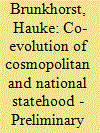

|
|
|
|
|
| Publication |
2012.
|
| Summary/Abstract |
The article claims that we should not just look towards a utopian future in fulfilling a claim about realization of a cosmopolitan, non-national world order. Already during antiquity the idea of a transcendent universal order took on a differentiated form at the same time as there happened to be institutionalization. Since the legal revolution of the long 12th century, this duality has been constitutional and has had a hierarchical structure. However, not only was the invention legal, it was also organizational; hence, the modern political, legal and organizational powers emerged long before the more celebrated state-building processes of the 16th and 17th centuries. The point is that the order was both political and cosmopolitan, institutional and universal. The nation-state was an exception compared with this long and widespread legacy of cosmopolitan power. But the universality of subjective rights was re-institutionalized according to principles that excluded inequalities. This was set in motion even before the UN Charter, not just with the ideas of 1789 but also institutionalized in Roosevelt's New Deal together with the social and political rights that were institutionalized specifically as a consequence of the World Wars and the political claims that followed.
|
|
|
|
|
|
|
|
|
|
|
|
|
|
|
|
| 4 |
ID:
113732
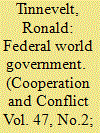

|
|
|
|
|
| Publication |
2012.
|
| Summary/Abstract |
Within contemporary legal and political philosophy there is nothing more unpopular than defending a world state. It seems food for thought for writers like Huxley or Wells, but not a topic that deserves serious philosophical reflection. Fortunately, there are exceptions to this general rule. Theorists such as Höffe, Cabrera, Deudney and Yunker defend a version of a multilayered minimal world state - a model based on the dual principles of federalism and subsidiarity. The focus of this article is on the very fragile balance that proponents of this model have to keep between a simultaneous need for centralization and decentralization. On the basis of a critical analysis of the work of these theorists, it is argued in this article that the safeguards these authors defend to prevent a bloating of government themselves contain a tendency to hierarchical centralization. While some form of world state might be necessary to cope with the challenges posed by globalization, it is essential to discuss the shape and competences of the world state much more critically and in more detail than has been the case in the past.
|
|
|
|
|
|
|
|
|
|
|
|
|
|
|
|
| 5 |
ID:
113731
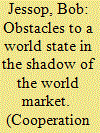

|
|
|
|
|
| Publication |
2012.
|
| Summary/Abstract |
This article explores the obstacles to the development and operation of a world state that are rooted in functional differentiation of modern societies, the ecological dominance of the broadly capitalist world market, and the inherent tendencies of all forms of governance to fail. It also highlights the challenges to the temporal as well as territorial sovereignty of states, whatever their scale of operation, due to the acceleration as well as globalization of social relations. Combining insights from Niklas Luhmann and Karl Marx, the article develops some novel arguments about multi-spatial metagovernance as an alternative approach to the problems posed by a world state as the guarantor of global social order.
|
|
|
|
|
|
|
|
|
|
|
|
|
|
|
|
| 6 |
ID:
113733
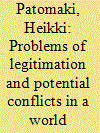

|
|
|
|
|
| Publication |
2012.
|
| Summary/Abstract |
There are good security and political economy reasons for furthering integration towards a world political community (WPC), possibly assuming the form of a world state. However, would these reasons provide a legitimate and sustainable basis for the WPC? It is argued in this article that, while the standard security-military and functionalist political economy arguments for world unification may work to a certain point, they are insufficient and may become counterproductive. Especially if perceived in terms of rationally calculative orientation of action, they are not enough and may even work against the WPC. There must also be a belief in normative legitimacy, which may be anchored in universal principles such as popular democracy and human rights. In this light, theories of civilizing process and stages of ethico-political learning are explored. Collective human learning not only explains the quest for democratization but also points towards cosmopolitan ethico-political sentiments. However, there is an internal relationship between democracy and identity, and identities tend to be particular. The case is made, first, for thinking that the otherness of one's narrated 'self' can be located either in the past or, alternatively, in our contemporary being, when seen from a point of view of a possible future position in world history. Second, within a higher level identity-in-difference, a co-constitutive and mutually transformative relation between self and others can involve letting many differences just be.
|
|
|
|
|
|
|
|
|
|
|
|
|
|
|
|
| 7 |
ID:
113735


|
|
|
|
|
| Publication |
2012.
|
| Summary/Abstract |
This rejoinder article takes the contributions in the Special Issue of Cooperation and Conflict - Vol. 46(3) - on Neutrality and 'Military Non-Alignment' as point of departure for a discussion of some of the problems former neutrals face in shaping their foreign and security policies. The author argues that current and future developments regarding neutrality norms are dependent on internal factors such as national identity and public opinion, and on external factors such as the military non-aligned states' relationships to EU, NATO and, not least, the UN. The possibility of a 'Second Option' of full-scale military cooperation if a preferred neutral position fails is discussed. Increased UN activism, for example, connected with the R2P concept and the tendency to outsource major UN-mandated military operations to NATO, is touched upon as well as the Libya crisis of 2011 and some of its implications for European foreign and security policy cooperation. Special attention is given to current Swedish debates on military non-alignment and NATO membership.
|
|
|
|
|
|
|
|
|
|
|
|
|
|
|
|
| 8 |
ID:
113728


|
|
|
|
|
| Publication |
2012.
|
| Summary/Abstract |
In some contrast to the traditional and ongoing normative discussions about the desirability of a world state, new and more explicitly geo-historical questions about world political integration are being posed, especially (i) whether elements of world statehood are in existence already, (ii) whether a world state is in some sense inevitable, and (iii) whether, and under what conditions, a world state would be sustainable? For instance, the existing and emerging structures of global governance, of a global public sphere and global constitutionalism can be argued to converge to form at least nascent forms of world statehood. Building on and complementing such diagnoses of existing forms of world statehood, the question arises about whether there are possible and likely, or even inevitable, futures in which the emergence of more 'thick' forms of a world state, understood as a more tightly and substantially integrated expression of political community, could evolve. This possibility raises further questions about the legitimacy, viability and sustainability of such a state form. After a brief overview of these issues, the Introduction provides a preview of the following contributions of this special issue as well as the distinction between the 'global' and the 'world' as one possible future research trajectory in the present context.
|
|
|
|
|
|
|
|
|
|
|
|
|
|
|
|
|
|
|
|
|